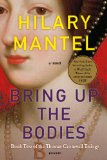Summary | Excerpt | Reading Guide | Reviews | Beyond the Book | Readalikes | Genres & Themes | Author Bio

Wolf Hall Trilogy #2
by Hilary MantelI
Falcons
Wiltshire, September 1535
His children are falling from the sky. He watches from horseback, acres of England stretching behind him; they drop, gilt-winged, each with a blood-filled gaze. Grace Cromwell hovers in thin air. She is silent when she takes her prey, silent as she glides to his fist. But the sounds she makes then, the rustle of feathers and the creak, the sigh and riffle of pinion, the small cluck-cluck from her throat, these are sounds of recognition, intimate, daughterly, almost disapproving. Her breast is gore-streaked and flesh clings to her claws.
Later, Henry will say, 'Your girls flew well today.' The hawk Anne Cromwell bounces on the glove of Rafe Sadler, who rides by the king in easy conversation. They are tired; the sun is declining, and they ride back to Wolf Hall with the reins slack on the necks of their mounts. Tomorrow his wife and two sisters will go out. These dead women, their bones long sunk in London clay, are now transmigrated. Weightless, they glide on the upper currents of the air. They pity no one. They answer to no one. Their lives are simple. When they look down they see nothing but their prey, and the borrowed plumes of the hunters: they see a flittering, flinching universe, a universe filled with their dinner.
All summer has been like this, a riot of dismemberment, fur and feather flying; the beating off and the whipping in of hounds, the coddling of tired horses, the nursing, by the gentlemen, of contusions, sprains and blisters. And for a few days at least, the sun has shone on Henry. Sometime before noon, clouds scudded in from the west and rain fell in big scented drops; but the sun re-emerged with a scorching heat, and now the sky is so clear you can see into Heaven and spy on what the saints are doing.
As they dismount, handing their horses to the grooms and waiting on the king, his mind is already moving to paperwork: to dispatches from Whitehall, galloped down by the post routes that are laid wherever the court shifts. At supper with the Seymours, he will defer to any stories his hosts wish to tell: to anything the king may venture, tousled and happy and amiable as he seems tonight. When the king has gone to bed, his working night will begin.
Though the day is over, Henry seems disinclined to go indoors. He stands looking about him, inhaling horse sweat, a broad, brick-red streak of sunburn across his forehead. Early in the day he lost his hat, so by custom all the hunting party were obliged to take off theirs. The king refused all offers of substitutes. As dusk steals over the woods and fields, servants will be out looking for the stir of the black plume against darkening grass, or the glint of his hunter's badge, a gold St Hubert with sapphire eyes.
Already you can feel the autumn. You know there will not be many more days like these; so let us stand, the horseboys of Wolf Hall swarming around us, Wiltshire and the western counties stretching into a haze of blue; let us stand, the king's hand on his shoulder, Henry's face earnest as he talks his way back through the landscape of the day, the green copses and rushing streams, the alders by the water's edge, the early haze that lifted by nine; the brief shower, the small wind that died and settled; the stillness, the afternoon heat.
'Sir, how are you not burned?' Rafe Sadler demands. A redhead like the king, he has turned a mottled, freckled pink, and even his eyes look sore. He, Thomas Cromwell, shrugs; he hangs an arm around Rafe's shoulders as they drift indoors. He went through the whole of Italy – the battlefield as well as the shaded arena of the counting house – without losing his London pallor. His ruffian childhood, the days on the river, the days in the fields: they left him as white as God made him. 'Cromwell has the skin of a lily,' the king pronounces. 'The only particular in which he resembles that or any other blossom.' Teasing him, they amble towards supper.
Copyright © 2012 by Hilary Mantel




Great political questions stir the deepest nature of one-half the nation, but they pass far above and over the ...
Click Here to find out who said this, as well as discovering other famous literary quotes!
Your guide toexceptional books
BookBrowse seeks out and recommends the best in contemporary fiction and nonfiction—books that not only engage and entertain but also deepen our understanding of ourselves and the world around us.